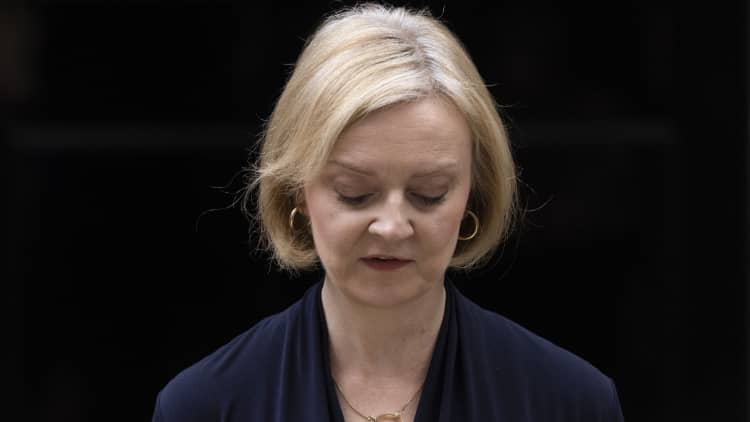Former US President Donald Trump during an Economic Club of New York event in New York, US, on Thursday, Sept. 5, 2024.
Bloomberg | Bloomberg | Getty Images
Fears are mounting that the U.S. could soon experience its own version of Britain’s “mini-budget” crisis, with bond strategists warning that Donald Trump’s return to the White House brings with it the specter of currency volatility and surging bond yields.
President-elect Trump has pledged to deliver a litany of pro-growth initiatives, including tax cuts, steep tariffs, and plans to roll back corporate regulation.
The former president’s economic agenda has ratcheted up concerns about a surge in consumer prices, which strategists say could spark significant shifts in bond yields and investor behavior.
They warn a scenario that mirrors Britain’s mini-budget crisis of 2022 is not out of the question.
“Foreign central banks and institutional investors, traditional buyers of US 10y Treasurys, are slowly diversifying away from Treasurys on debasement worries attached to concerns over inflation, debt, and geopolitics,” Alim Remtulla, chief foreign exchange strategist at EFG International, told CNBC by email, with reference to 10-year U.S. Treasurys.
“As a result, more price sensitive investors need higher yields to invest in Treasuries. This isn’t at crisis levels yet, as [the U.S. dollar] is outperforming,” he continued. “But there are worries that the US could experience a run on its currency and yields like the UK experienced in the Fall of 2022.”

Britain’s mini-budget crisis refers to a tumultuous period under former Prime Minister Liz Truss and ex-Finance Minister Kwasi Kwarteng.
Shortly after taking up their posts in early September 2022, Truss and Kwarteng triggered a crash in government bond prices when they presented plans for big tax cuts in an unscheduled fiscal announcement.
The British pound tumbled to an all-time low against the U.S. dollar after the measures were announced, while the sell-off in U.K. government bonds was so severe that the Bank of England staged an emergency intervention.
Truss and Kwarteng resigned over the turmoil after less than two months in their respective offices, and the majority of the measures were reversed.
‘Investors are becoming a little nervous’
Althea Spinozzi, head of fixed income strategy at Saxo Bank, said Trump’s return to the White House has the potential to reshape the U.S. bond market “in profound ways,” with the trajectory of Treasury yields set to climb as markets adjust to higher inflation expectations.
The benchmark U.S.10-year Treasury may yet breach the 5% mark, Spinozzi said, without specifying a timeline, noting that this level acts as a “magnet” in the current economic environment.

“A Trump presidency also brings the specter of currency volatility. Concerns about the U.S. fiscal position, fueled by increased borrowing to fund tax cuts and spending, might prompt fears of a selloff in Treasuries, mirroring the turmoil seen in the U.K. in 2022,” Spinozzi said.
“The U.S. dollar’s unique position as the world’s reserve currency and the unparalleled depth of the Treasury market provide a degree of resilience,” she continued.
“That said, a sustained rise in yields could weigh on the dollar’s strength over time, particularly if inflation expectations become unanchored or global investors begin seeking alternatives,” Spinozzi said.
Traders work on the floor of the New York Stock Exchange at the opening bell on November 13, 2024, in New York City.
Angela Weiss | AFP | Getty Images
The 10-year Treasury yield traded more than 4 basis points higher at 4.424% on Wednesday morning. Yields and prices move in opposite directions, and one basis point equals 0.01%.
Bond yields tend to rise when market participants expect higher consumer prices or a growing budget deficit.
Paul Ashworth, chief north America economist at Capital Economics, told CNBC that while a U.S. version of Britain’s mini-budget episode is possible, the dollar’s position as the world’s reserve currency “makes it hard to see a sudden crisis developing.”
“But the so-called term premium component of Treasury yields could increase, indicating that investors are becoming a little nervous about swallowing the increased supply of bonds,” Ashworth said.
‘Tough to see happening’
“Of course there is a prospect of that happening. You can’t rule any of this out,” Thierry Wizman, global interest rates and currencies strategist at Macquarie Group, told CNBC via video call.
“If this does happen, it’s likelier to be as a result of the U.S. going its own way with regard to deficit spending,” Wizman said.
“If every country is looking equally irresponsible, then the chances of this happening are slim, certainly on a sustainable basis. But when all the countries are experiencing high debt ratios and high deficits, then it‘s less likely because in effect there is nowhere to run, with the possible exception of physical assets like gold.”
Referring to the behavior of private institutional investors, Wizman said a divergence would be necessary to facilitate a U.S. version of Britain’s mini-budget crisis.
“It would take another country, another region like the euro area supplanting the U.S. with regard to fiscal responsibility. That’s tough to see happening,” he added.
— CNBC’s Jenni Reid contributed to this report.
Credit: Source link













